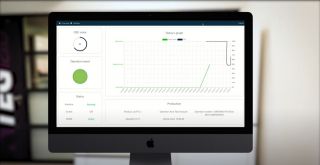Affective Manufacturing System
Introduction
The Trinity project team from Mentech and Tegema developed a demonstrator in which an ABB cobot works with an operator while performing complex assembly tasks. Stress detection was integrated to measure operator emotion during a cobot-assisted assembly task for optimal operator engagement (both in terms of operator well-being and productivity).
The objective of the project is to demonstrate a smart factory concept, for robotics-based manufacturing of complex photonic products, with in-line operator stress detection for safety and optimized production (in terms of yield and product quality). The demonstration is based on a modular machine platform with robotics functionalities for efficient and customized production of complex photonic systems. The platform has in-line monitoring and quality control functionalities for in-line adaption of production steps. The demonstration includes an appealing showcase in which human factors are successfully included in the execution of a manufacturing process for optimized production, eventually to open the gateway for affective cobots.
A robot can take over complex tasks, making the assembly process safer, faster and qualitatively better. The downside of working with a cobot is that the potential loss of control can cause stress for the operator. And stress has a negative impact on well-being, safety and productivity.
The affective manufacturing system has an integrated robotics system for manufacturing of complex photonic systems and contains a sensor system for in-line process monitoring. The platform integrates a novel operator stress detection module, based on measured physiological features of the operator, and artificial intelligence algorithm for stress detection. Production performance and related operator stress is displayed on an interactive dashboard, used for both stress management and process control.
The measured stress levels are used in a smart decision algorithm that takes into account all relevant decision factors, such as the stress indications (emotional state) of the individual operators as determined by the measured and analyzed features; information about circumstances (private, work) of the employee; information about the production process, such as the measured performance indicators (product quality, productivity, failure, etc.); and production instructions (such as the complexity of the instruction or work).
Benefits for the user
Affective manufacturing leads to improved efficiency and productivity, by incorporating human stress factors in the optimization of the production processes. The performance of a process depends on the complexity of tasks and the arousal level the operator experiences. For simple tasks, low arousal (inattention of the operator) leads to poor performance, high arousal leads to high performance. Difficult tasks however require moderate arousal for optimum performance. A too low arousal (inattention or drowsy) as well as a too high arousal (stress) lead to poor performance and should be avoided.
Affective manufacturing leads to improved product quality. One of the requests is error-free production through a self-learning production method in which the system responds autonomously to any errors. The addition of affective strategies will further be strengthening this self-learning and will cause a paradigm shift in smart manufacturing. It will create higher standards of production, and more operator and happiness.
Innovation
Mentech and Tegema demonstrate an affective production platform for high-quality production of low-volume high-mix products. The demonstration is based on a modular machine platform with robotics functionalities for efficient and customized production of complex photonic devices. The platform integrates operator stress monitoring to harmonize productivity and operator happiness.
The platform comprises a pick-to-light module and a cobot module for cobot-assisted assembly. The pick-to-light module consists of several manufacturing bins with LED indicators to guide the operator through the assembly tasks. The sequence of assembly is indicated by the subsequent switching on and off the LED indicators. The bins also contain proximity sensors to measure the completion of the different assembly tasks. A cobot platform is integrated in the assembly line to assist the operator with complex assembly tasks. Multiple assembly sequences can be uploaded to the system, making the system a flexible manufacturing platform.
The operator stress is determined from real-time measured stress features, like heartrate, skin conductance and face expressions. A trained neural network model makes a prediction of the stress levels of an operator during assembly based on the measured physiology and recognized patterns.

A dashboard visualizes the system metrics, like the required time for assembly tasks, assembly errors and cobot performance, and the measured operator stress. Based on the dashboard outcome, system and operator interventions can be initiated.
The AMS showcases that a hybrid manufacturing platform with a decision algorithm based on operator stress levels will harmonize production and increase yield and production quality.
[maxbutton id=”1″ url=”https://www.youtube.com/watch?v=2eOMwksg5sc” text=”Watch the video!”] Visit Trinityrobotics.eu
Partners
This SME demonstration of TRINITY project has received funding from the European Union’s Horizon 2020 research and innovation programme under grant agreement No 825196.



